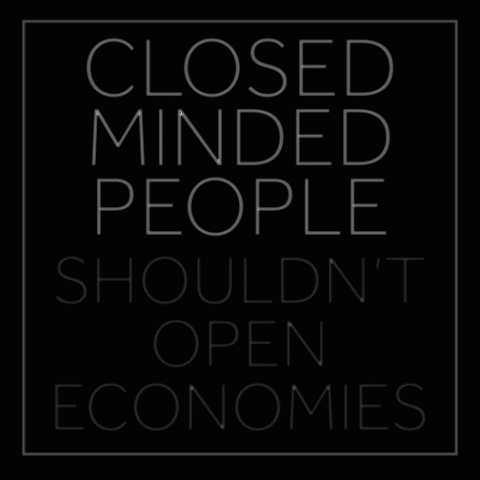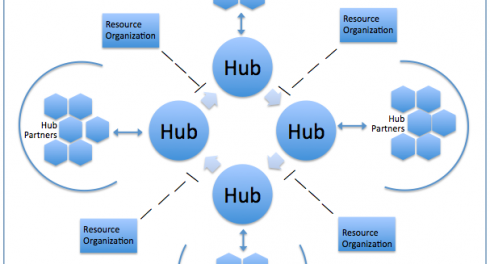Highlights
- Love to be feared vs. fear to be unloved
- Piping up
- Lend it, map it
- Seeking a higher calling
- Open frontiers
- Systems change investor style
- TAI Spotlight: Data use in context
Love to be feared vs. fear to be unloved

Photo Credit: Video arts
Minxin Pei takes a look at totalitarianism’s long shadow in China and why democratizing a post-totalitarian regime is far more difficult than democratizing an authoritarian regime. He notes that “a tantalizing possibility is that regimes (such as communist dictatorships) which are at first more resistant to democratization by that same token become more vulnerable to revolution.” Shelley Inglis notes that for autocrats, ruthless repression is often a winning way to stay in power, and there’s not too much the rest of the world can do to stop them.
Even autocrats like public adulation, but how to account for the often-looming gap between how politicians see themselves and how publics characterize them? Duncan Greene reviews a new book on the moral economy of elections in Africa that may offer some answers.” Heading further South, the Australian Leadership Index Annual Report similarly examines how the Australian population views the actions of leaders across the government, public, private and not-for-profit sectors.
Of course, opinions of government have depended a lot on perceptions of handling of the pandemic. Yet, for all too many governments, the pandemic has been an excuse to clampdown on public expression. In Latin America, CSOs continue to monitor human rights, conduct legal advocacy, and keep citizens informed about the impacts of disproportionate and illegal use of emergency powers, while Amnesty International details the aggravation of existing patterns of abuses and inequalities in Europe and Central Asia. Some governments have used the crisis “as a smokescreen for power grabs, clampdowns on freedoms, and a pretext to ignore human rights obligations.”
One case in point – Pakistan – where the government is accused of sabotaging the national human rights commission to avoid facing accountability for human rights violations, especially those committed at the hands of its own military. Talking of militaries, Paul Sein Twa says imposing targeted sanctions and ensuring international funds do not benefit the military junta is crucial to supporting the people in Myanmar. He urges the World Bank and other development banks to “start listening to health workers and local civil society organizations to find concrete ways to support them — for example, by directing funds directly to them.”
Turning to Africa, President Talon of Benin is likely to be re-elected following a turbulent presidential election marred by deadly protests, the detention of opposition leaders, and widespread problems in identifying or registering voters. For a sense of trends continent-wide, check out the ninth edition of the Africa Integrity Indicators now out. Pair with five new research projects funded by JPAL’s Governance Initiative that are generating key insights about how to effectively improve governance outcomes in low- and middle-income countries.
Piping up
Staying with the theme of strongmen, green groups warn against President Duterte’s decision to open the Philippines further to the mining industry where indigenous communities will be disproportionately impacted. Minerals such as cobalt are essential to the green energy transition, but Prince De Makele Mounguembou warns that it is not sustainable to rely on supply chains built on human exploitation. This will likely resonate with the Oxfam team who have released their Natural Resource Justice Strategic Plan 2021-2025 partnering with communities adversely impacted by the extractives industry.
Meanwhile, fossil fuels continue to be a mainstay for many. Uganda and Tanzania finally signed agreements this past week to move on the East Africa Oil Pipeline despite environmental risks. Read the protest letter signed by 38 groups from both countries. Uganda’s National Oil Companies reps might have wanted to tune into EITI’s recent Transparency Matters webinar on the evolving nature of public expectations toward state-owned enterprises.
Nigeria Extractive Industries Transparency Initiative (NEITI) continues to expand its scope of coverage from oil and gas extractive revenues to include environment, energy transition, gender inclusiveness across the extractive industries. Of course, the EITI standard now requires beneficial ownership disclosure – something sure to cheer Sarah Dickson, who lays out four ways beneficial ownership information can benefit the sector. Another reason to cheer as the Canadian government includes funding to create a publicly accessible beneficial ownership register in its budget yesterday (Monday).
Lend it, map it

Can the taxman help the energy transition? The European Union aims to set precedent with a border adjustment carbon tax on imports. That will have the benefit of raising much-needed revenue in straitened fiscal times. To understand other fiscal innovations in response to the pandemic, look for a new OECD report out tomorrow examining how tax policy responses have varied across countries plus guidance on how tax policy can be adapted to address the short-term challenges countries face.
Not that all the innovation needs to come from government. TAI held a session recently on civil society roles in tax administration (paper soon to be published). One example for future examination is being set by TaxWatch whose “Tax and the Rule of Law project” aims to improve the application of the rule of law in tax administration by ensuring that the public interest is more effectively represented in the courts and by regulators.
Of course, we know what happens when public interest is not to the fore – leakage at scale that typically hurts the poorest. The latest UNCTAD report cites Africa losing US$90billion annually through illicit financial flows, and Afrodad urges implementation of the UN FACTI panel recommendations in response. New action is certainly needed – the Economist among those acknowledging that the war against money laundering is currently being lost.
Given financial strains, perhaps no surprise that momentum is building for greater sovereign debt transparency, not least through the OECD’s debt data transparency initiative. Hervé Lado, David Mihalyi, and Amir Shafaie are particularly concerned for transparency around Chinese lending and resource-based financing, so maybe excited to read How China Lends that gives an overview of Beijing’s lending stipulations after examining 100 contracts. The authors warn that restrictions on debt transparency make it difficult for citizens in borrower countries and creditor countries to hold their governments accountable.
Want to know of Chinese investment in your neck of the woods? Another new source may help – the People’s Map of Global China – an “interactive, open access, and online ‘map’ format, created by non-governmental organizations, journalists, trade unions, academics, and the public to provide updated and updatable information on various dimensions of Global China in their localities.”
Seeking a higher calling
Matthew Cummins and Isabel Oritz write on the looming budget cuts following a global study that sounds an alert of an emerging austerity shock that could affect about 6.6 billion people in 2022. The duo advised that instead of slashing spending, governments can and must explore financing options to increase public budgets.
Meanwhile, the recently created Civil Society Collaborative on Inclusive COVID-19 Data will work alongside marginalized communities and activists to understand the effects of the COVID-19 pandemic and collectively advocate for an inclusive recovery.
Staying big picture, Mariana Mazzucato urges a return to mission-oriented public procurement as vital to build back better. Perhaps that will also inspire European governments. The Council of Europe calls on states to do more to tackle corruption risks – countries must apply “transparency, oversight and accountability” to the large cash injections being received due to the pandemic, including from the EU’s own recovery fund. The UK continues to be a source of fraud at scale.
Not that US regulators should be sitting on their laurels – especially after the president of Greenlight Capital warned this past week that Wall Street has no cop on the beat: “It’s as if there are no financial fraud prosecutors; companies and managements that are emboldened enough to engage in malfeasance have little to fear.”
More inspiringly, as African countries push for local procurement to be informed by data and public monitoring, Nigeria’s Subnational Budget Transparency Survey 2020 showed state governments have significantly improved budget transparency and participation as well as their respective procurement processes. Hopefully such examples can motivate those gathering in Rwanda for the 13th East African Procurement Forum with the theme “Strengthening Integrity and Accountability in Public Procurement for an Effective Emergency Response.”
Open frontiers

The pandemic has further demonstrated the importance of scientific collaboration built around open sharing of information. Can it inspire a broader opening of the research world? Tom Drake, Rose Oronje, and Jon Harle outline why affordable, open access to research is a critical issue for global development with provide recommendations on how to improve the indefensible research publishing industry – and improve the impact of public research.
Blockchain has been told as another tool for locked and loaded information availability. However, the question remains whether blockchain can deliver on the demand for trust within the educational sector. Will privacy concerns and fake credentials appearing on an immutable ledger undo its potential?
Diana Coyle warns that before we entrust more decisions to data-based machine-learning and AI systems, we must be clear about the limitations of the data.
Jeni Tennison looks at the objectivity of the data used in the Sewell report by the Commission for Race and Ethnic Disparities – focusing on how ethnicity is categorized, the government’s use of data, and inequalities in the UK’s digital public services.
Systems change investor style
Last week we flagged how #shiftthepower conversations have even reached the investment world. This week, Alyssa Ely and Denise Hearn interrogate the dynamics of investment decisions and operations, noting that “Overcoming systemic injustices will take more than moving money.” Pair with this piece that shows how a diverse set of investors have taken practical steps to incorporate global systems challenges into their daily investing.
Seven years after “The Resilience Dividend was published, Mike Scutari takes a look at what resilience mean for the philanthropic leader who wrote the book on it? Scutari also examines how fundraising has evolved during the pandemic and, together with Holly Hall, wonders what the next chapter of fundraising will look like.
Finally, the use of photography within international development has often been accused of reinforcing stereotypes. So what to do? Isabelle Kermeen shares how Integrity Action has been using illustrations and animations to communicate their work and why they think it’s interesting for others.
TPA Full Disclosure: Munyema Hasan on putting learning into action

Munyema Hasan began her career in South Asia, where she worked with marginalized groups to understand where governments were failing to deliver and why. Ten years on, she serves as the Deputy Director of Learning and Impact at the Open Government Partnership, where she works with over fifty global staff to help government and civil society reformers design problem-driven, agile, and politically astute approaches to policymaking. She shares insights into the importance of learning for an organization and what such learning process means in the long run.
Essential Resource: TAI Grants Database

Wonder who TAI members fund? Want to know which grantees they have in common? Wonder no more. Check out our collective database of transparency, participation and accountability related active grants made by TAI members. We hope this is useful to funders, grantees and all those in the field. Feedback welcomed.
TAI SPOTLIGHT: Data use in context
Data use in context: Opportunities and challenges for the use of data for accountability in Nigeria | Transparency and Accountability Initiative (TAI)
What progress has been made (and what challenges remain) around using data for anti-corruption efforts in Nigeria? Find out in this report + recommendations on how to improve the impact of efforts to use data for accountability and anti-corruption in Nigeria.
Religious Communities’ Roles in Anti-Corruption | MacArthur Foundation
MacArthur Grantee, Chatham House takes a look at the drivers of corruption and examines the role of religion in anti-corruption efforts in Nigeria. The MacArthur-supported report suggests that shifting norms to oppose corruption requires collective participation and changing community expectations rather than relying on individual morals.
BUILD Initiative | Ford Foundation
Last week, we told you the foundation has expanded its ground breaking BUILD grants program. See what a difference the multi-year flexible support made in the operations of Akili Dada, Firelight, and Demos’s growth, especially how it helped the scale so quickly and successfully. For more information on learnings and progress made with the BUILD program, see the BUILD Evaluation’s Interim Report.
How governance researchers are studying (and adapting to) COVID-19 | Hewlett Foundation
The Foundation’s TPA team spoke with civil society and research organizations they support to better understand how they are adapting to the constraints of COVID-19, and what they see as its implications for their work going forward.
The climate emergency demands a new approach to investor-state disputes| Open Society Foundations
A little-known treaty allows corporations to sue countries for decisions that negatively impact their profits. Without reforming this, big energy corporations can easily block efforts to combat the climate crisis.
Job Listings
- Job postings at Hewlett Foundation – Ongoing
- Job postings at MacArthur Foundation – Ongoing
- Job postings at Open Society Foundations – Ongoing
- Job postings at Luminate – Ongoing
- Job postings at Ford Foundation – Ongoing
Calls/Opportunities
- Funds for civic empowerment organizations in Latin America – April 30, 2021
- Paris Peace Forum: Call for projects – May 9, 2021
- West Africa Civil Society Institute (WACSI) call for papers and articles – Open year-round
- USAID’s Development Innovation Ventures (DIV) grant funding – Ongoing
- Call for research proposals Tax and civil society – No Deadline
- Free digital security training – Ongoing
- Call for proposals: Informality, tax, and the state – Proposals accepted on a rolling basis
Calendar
- Building resilient health financing in the wake of COVID-19: The role of subnational citizen fiscal advocacy in Kenya – Apr 21, 2021 (08:00 AM EST)
- Is doing good, good enough? – 22 April 2021 (12:00 – 13:00 CDT)
- The climate crisis and humanitarian need: Responding for the world’s most vulnerable communities – April 29, 2021 (09:00 EDT/14:00 BST)
- Implementing ESG Due Diligence and Transparency in Extractive Commodity Trading – April 29, 2021 (8am ET / 2pm Paris)
- Reimagining fundraising: Using cost-effective AI to increase and improve your fundraising – April 29, 2021.
- The Presidents’ Forum on racial equity in philanthropy – April 30, 2021 (1 p.m. – 2:30 p.m. CT)
- Effective storytelling for community engagement – May 6, 2021 (1:00pm – 2:30pm EDT)
- Weaving systemic alternatives from the Global South: A conversation with the Global Tapestry of Alternatives – May 11, 2021 (14:00 UTC)
- Frontiers of Social Innovation – May 11-13, 2021
- Virtual convening of Frontiers of Social Innovation: “People, Power, Resources: Enacting an Equitable Future” – May 11-13, 2021
- Purpose-driven board leadership: Reconceiving foundation governance – May 13, 2021 (2:00 pm – 3:15 pm EDT)
- Open Gov week (Virtual) – May 17-21, 2021
- Empowering communities using geospatial technology – May 25, 2021 (10:00 EST)
- Global Investigative Journalism conference – November 3-5, 2021


